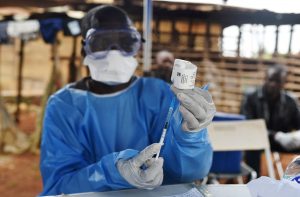
KINSHASA (Reuters) – The Ebola outbreak in eastern Congo is now the second biggest in history, with 426 confirmed and probable cases, the health ministry said late on Thursday.
The epidemic in a volatile part of Democratic Republic of Congo is now only surpassed by the 2013-2016 outbreak in West Africa, where more than 28,000 cases where confirmed, and is bigger than an outbreak in 2000 in Uganda involving 425 cases.
Ebola is believed to have killed 245 people in North Kivu and Ituri provinces where attacks by armed groups and community resistance to health officials have hampered the response.
Congo has suffered 10 Ebola outbreaks since the virus was discovered there in 1976. It spreads through contact with bodily fluids and causes hemorrhagic fever with severe vomiting, diarrhea and bleeding, and in many flare-ups, more than half of cases are fatal.
“This tragic milestone clearly demonstrates the complexity and severity of the outbreak,” Michelle Gayer, Senior Director of Emergency Health at the International Rescue Committee said in a statement. “The dynamics of conflict (mean) … a protracted outbreak is … likely, and the end is not in sight.”
(Reporting by Giulia Paravicini; Editing by Tim Cocks and Andrew Heavens)

